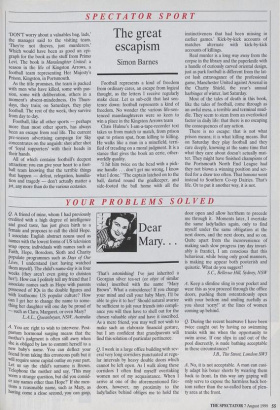SPECTATOR SPORT
The great escapism
Simon Barnes
'DON'T worry about a valuables bag, lads,' the manager said to the visiting team. 'They're not thieves, just murderers.' Which would have been as good an epi- graph for the book as the stuff from Primo Levi. The book is Manslaughter United: a season in the life of Kingston Arrows, a football team representing Her Majesty's Prison, Kingston, in Portsmouth.
As the tide promises, the team is packed with men who have killed, some with pas- sion, some with deliberation, others in a moment's absent-mindedness. On Thurs- days, they train; on Saturdays, they play football. The rest of the week, they survive from day to day.
Football, like all other sports — perhaps more than most other sports, has always been an escape from real life. The current pre-season advertising campaign for Sky concentrates on the anguish: shot after shot of 'loyal supporters' with their heads in their hands.
All of which contains football's deepest attraction: you can give your heart to a foot- ball team knowing that the terrible things that happen — defeat, relegation, humilia- tion and tragedy — don't actually matter a Jot, any more than do the various ecstasies. Football represents a kind of freedom from ordinary cares, an escape from logical thought, as the letters I receive regularly make clear. Let us sub-edit that last sen- tence down: football represents a kind of freedom. No wonder the various life-sen- tenced manslaughterers were so keen to win a place in the Kingston Arrows team Chris Hulme's I-am-a-tape-recorder text takes us from match to match, from prison spat to prison spat, from killing to killing. He walks like a man in a minefield, terri- fied of treading on a moral judgment. It is a stance that gives the book an eerie, other- worldly quality. 'I hit him twice on the head with a pick- axe handle . . . don't get me wrong, I know what I done.' The captain latched on to the ball, darted round the goalkeeper, and side-footed the ball home with all the instinctiveness that had been missing in earlier games.' Kick-by-kick accounts of matches alternate with kick-by-kick accounts of killings.
Real murder is a long way away from the corpse in the library and the paperknife with a handle of curiously carved oriental design, just as park football is different from the lat- est lush extravagance of the professional game, Manchester United against Arsenal in the Charity Shield, the year's annual harbinger of winter, last Saturday.
Most of the tales of death in this book, like the tales of football, come through as an awful mess, a terrible and terminal mud- dle. They seem to stem from an overlooked factor in daily life: that there is no escaping the consequences of any action.
There is no escape: that is not what prison means; it is what killing means. But on Saturday they play football and they care deeply, knowing at the same time that what they care about doesn't actually mat- ter. They might have finished champions of the Portsmouth North End League had they not blown a winning position and set- tled for a draw too often. That honour went instead to Southern Co-op Dairies. That's life. Or to put it another way, it is not.


























































 Previous page
Previous page